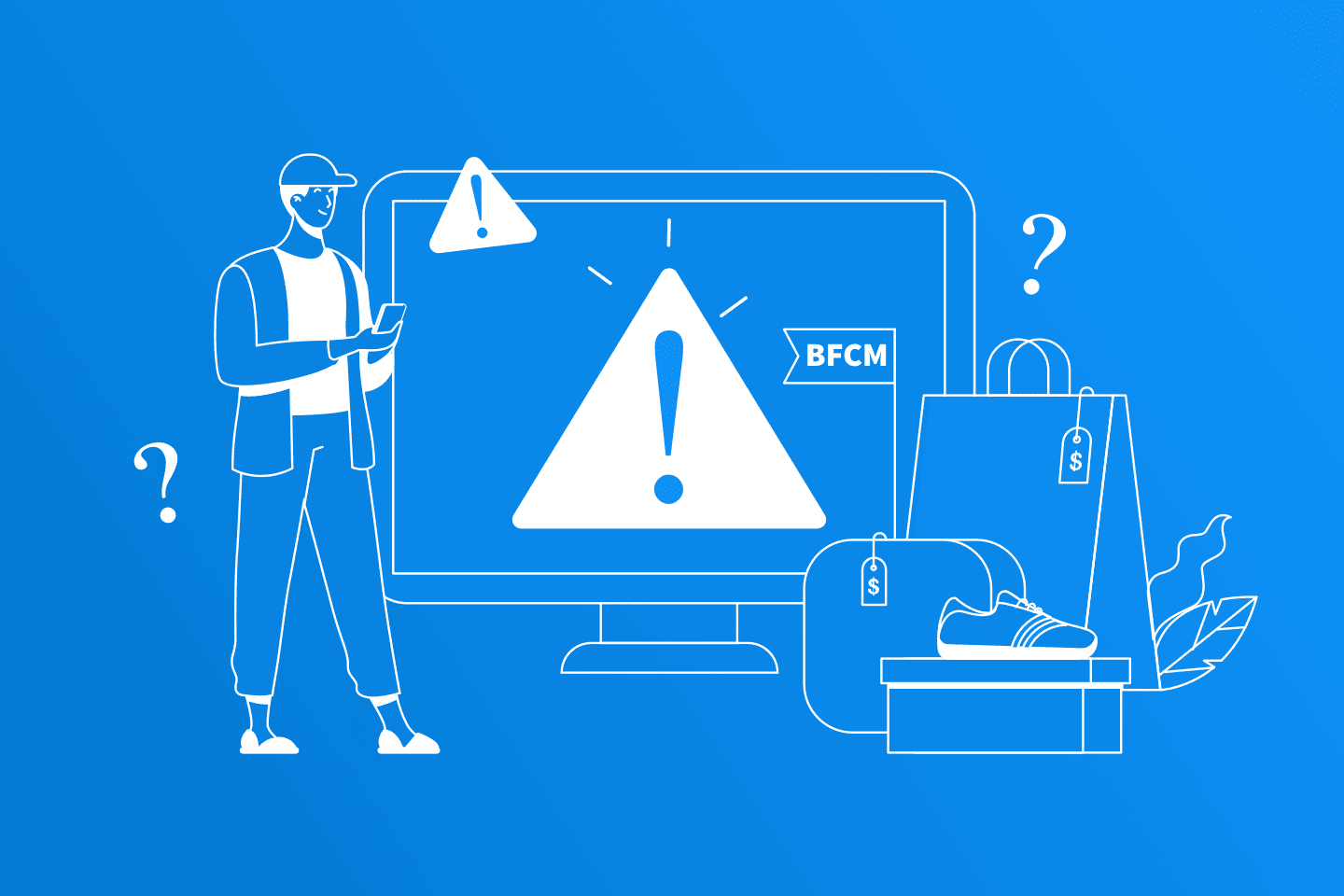It’s almost that time of the year again—the Black Friday and Cyber Monday (BFCM) weekend is what eCommerce brands spend most of the year preparing for. As brands get ready for the biggest sale event of the year, it’s important to look back at the most common BFCM mistakes that can leave a sour taste in customers’ mouths.
What can a mistake cost your eCommerce brand during BFCM?
Let’s look at BFCM data from the past years:
- 2021: During Black Friday, American consumers spent $8.9 billion online. Meanwhile, Cyber Monday logged a whopping $10.7 billion.
- 2022: Black Friday raked in $9.12 billion and Cyber Monday generated $11.3 billion
- 2023: Black Friday pulled in $9.8 billion, and Cyber Monday once again broke records with $12.4 billion.
One thing remains true: shoppers are ready, willing, and able to shop until they drop.
However, one mistake can make or break your BFCM season. Possible horror stories:
A discount code fails to work. Your customers get frustrated and leave. They flock over to competitor websites with massive discounts and codes that actually work.
Your site crashes because it wasn’t ready for heavy traffic. Instead of raking in record-breaking sales, you’re left hanging.
One mistake, and it will surely be a BFCM you’ll never forget—for the wrong reasons.
BFCM Reveal: Insiders share the most common mistakes by eCommerce brands
We’ve gone in a different direction for this year. We’ve consulted experts who have years and years of experience helping eCommerce brands succeed.
But instead of presenting you with tips and strategies, here’s a compilation of the most common mistakes that eCommerce brands end up committing—no matter how much they prepare for BFCM.
BFCM Mistake #1: Neglecting to test and review the technology behind the eCommerce store
A lot of eCommerce brands choose to prioritize the discounts and limited edition bundles that they will offer for BFCM. While there’s nothing wrong with this, sometimes the tendency is to forget the most important thing—the eCommerce store itself.

Amanda Hiebert, ShopCircle’s Head of Content emphasizes the need for eCommerce brands to conduct comprehensive testing before BFCM. No matter how much traffic your site receives and how many consumers want to purchase from you—if your store is not ready for the BFCM chaos, you’re going to lose so much potential revenue.
According to her, these are the five major things to test:
- Speed: How quickly do your pages load?
- Scalability: How much traffic can your store handle all at once?
- Stability: How reliable is your app’s performance?
- Responsiveness: Does it work seamlessly on different screens and devices?
- Spike test: How well can it handle massive spikes of traffic
Cyber security and data privacy are also crucial. Don’t forget to install additional security steps for both store managers and customers such as multi-factor authentication, regular backups, and stronger password preferences.
“When a cyber-attack strikes, it can cause business disruption, financial loss, and serious reputational damage,” Charlotte Davies from Velstar adds. “In fact, 81% of consumers would stop engaging with a brand online after a data breach.”
Lastly, here’s a bonus tech tip from our friends at Aircall, represented by Emily Gregor, Senior Content Marketing Lead: Connect your CRM and eCommerce tools to your existing voice solution.
Integrating all your tech tools will make it easier to collaborate with your internal team, access critical customer and order data easily, and streamline the entire customer journey.
“Make sure that the VoIP provider of your choice can connect to your existing tools,” Emily explains. “This will make the transition seamless and help your team focus on what matters the most—creating positive and memorable customer experiences.”
BFCM Mistake #2: Relying only on discounts and offering limited shipping options
Charlotte Davies, Velstar’s Internal Marketing Manager emphasizes the need to diversify when it comes to discounts and shipping options.
More often than not, brands will offer jaw-dropping discounts to attract customers to spend. However, some customers will only visit a store to scout the best deals and then end up buying nothing.

Now, when it comes to shipping, not offering the right options can cost you sales. If a customer arrives at the checkout process and their shipping preference isn’t available, there’s a huge chance that they will leave.
Here are some quick tips from Velstar and ShopCircle:
- Offer flat rate shipping. This appeals to customers and cuts down shipping costs for your store.
- Offer free shipping for spending thresholds. This keeps customers happy while increasing their average order value at the same time.
- Be transparent so customers see accurate shipping rates before checking out. Often, hidden shipping costs push a customer to cancel the purchase.
Lastly, never take the post-purchase experience for granted. Make sure to communicate shipping dates clearly to manage expectations and have a clear returns policy in place to avoid disappointing customers.
BFCM Mistake #3: No diversification of media spend
Hawke Media’s very own Director of Growth, Madena Ghani, explains that there needs to be a balance between top-of-funnel, middle-of-funnel, and bottom-of-funnel strategies. In short, don’t put all of your eggs in one basket. Diversify your marketing efforts and presence across channels.
With attribution shifting, it’s not enough to focus on Return On Ad Spend (ROAS). Instead, brands should also start looking into the Marketing Efficiency Ratio (MER) which measures the overall performance of all your digital marketing efforts combined.

A lot of eCommerce brand owners tend to dump a bunch of money into their bottom-of-funnel strategies.
In reality, customers would have never been exposed to the brand without the top-of-funnel strategies.
BFCM Mistake #4: Not leveraging UGC
Did you know that 70% of consumers check out User-Generated Content (UGC) before buying something? At the same time, UGC increases conversions by 10%.
What does this mean? The impact of UGC on revenue is undeniable.
A big mistake that eCommerce store owners make is measuring UGC success by the number of big conversions and direct sales they generate. They don’t understand that the real value of UGC is its contribution to credibility and content.
Not investing in content creators is a huge mistake that can cost you. Creators know the trends and they can help market products to different audiences.
Some quick examples:
- Wellness products are included in daily “Get Ready With Me” vlogs or reels
- For fashion brands, creators show different styles on different body types
- For beauty products, creators often shoot DIY makeup tutorials for different occasions
Madena Ghani from Hawke Media also emphasized that another common mistake is how eCommerce brands end up not maximizing their partnerships with content creators. “Many times, I see brands having either too much or too little control when working with creators,” she says. “There needs to be trust and balance when managing this.”
One tip to maximize your UGC strategy: Create guidelines and suggestions, but don’t stifle their creativity and originality.
BFCM Mistake #5: Promoting too late
Major BFCM pitfall: waiting too late before announcing your BFCM deals.
When it comes to BFCM marketing, there’s such a thing as too early and too late. Announce your deals too early and you’ll get overshadowed by other brands. Announce too late, and your customers will be too busy to check.
So what should you do? “Build hype, excitement, and a sense of urgency,” says Amanda Hiebert of ShopCircle.
Don’t be afraid to send hype emails and SMS messages, especially on the days leading up to BFCM. And once BFCM weekend is already underway, make the most of retargeting and cart recovery strategies to keep your customers on their toes.
BFCM Mistake #6: Forgetting to set up customer retention strategies
BFCM brings in a huge influx of new customers. If you play your cards right and set up a post-BFCM retention strategy, your new customers will stick around for the long haul.
When new customers become repeat customers and eventually loyal fans, they actually generate 44% of brands’ total revenue despite making up only 21% of a brand’s customer base.
Most eCommerce brands tend to focus so much on generating record-breaking sales that they forget to plan out what can be done after BFCM to sustain the momentum.
A strong retention strategy includes a combination of the following:
- Loyalty program
- Dependable customer service support
- A solid new customer nurture flow
- Timely and targeted email/SMS campaigns

Ben Wright, Help Scout’s Director of Strategic Partnerships explains that an eCommerce brand can experience “irrevocable damage” if they don’t focus on keeping and nurturing new and existing customers.
The truth is, eCommerce brands will survive even after BFCM weekend. “The hope for most businesses should be that they not only sell to a customer once but that the customer keeps coming back because of the wonderful experience you’ve given them,” Ben shares.
BFCM Mistake #7: Taking customer support for granted and assuming that the current team can handle BFCM
Aside from forgetting to set up post-BFCM retention strategies, eCommerce brands also tend to forget that customer support actually plays a huge role during BFCM.
Even if your site gets a lot of traffic and interest, faulty customer support agents and processes can lead to unsatisfied customers.
Most of our partners are well-experienced in helping various eCommerce brands with their customer support systems. So we’ve compiled their top recommendations and tips on how eCommerce brands can prep their customer support for the BFCM chaos.
Automate as much as you can so you can focus on complex tickets

Ajay Suresh, Richpanel’s Go-to-Market Strategy Lead explains that 74% of agents are at risk of burnout. That’s why managing BFCM support tickets is important so agents don’t get overwhelmed.
However, not all queries require a conversation with an agent to be resolved. About 40-50% of your ticket volume tends to be repetitive. By automating the repeat queries through an intuitive self-service portal, you can bring down your order-to-ticket ratio by 10-15%.
“It’s important to only route those tickets which require support or complex solutions to an agent,” Ajay says.
Hire and onboard new team members early
Now is actually the perfect time to hire and onboard new staff so you can get them up to speed just in time for BFCM.

However, there are reasons why eCommerce brands hesitate when it comes to hiring additional manpower:
- No resources to focus on hiring, onboarding, and training
- The difference in the volume of BFCM tickets compared to the rest of the year is too big to justify hiring full-time staff
So what should you do? Here are some alternatives:
- If you’d like to hire additional staff but you don’t have the resources to focus on doing so, you can always outsource your eCommerce customer support. LTVplus provides tailored solutions from hiring, training, QA, and even monitoring and management.
- Hire seasonal or part-time support staff on a contractual basis. They can step in and help during BFCM and step out afterward when the full-time staff can handle the usual volume of support tickets.
Don’t forget about your phone support channel
Deprioritizing the phone channel is a huge mistake that brands commit because they tend to focus on social media, email, or live chat.
However, a recent survey shows that around 42% of US customers prefer phone conversations to resolve their problems. This can translate to having too many calls and too few agents. What should you do?

Shawn Li from Flip explains that the solution to avoid overwhelming support agents is to invest in automating customer service ahead of the peak season. By automating a good percentage of calls, brands can efficiently resolve basic and repetitive issues without having to take up a support agent’s time—reserving them for complex issues.
Wrap up: Breeze through BFCM by avoiding these common slip-ups
While competition is pretty high during the BFCM sales phenomenon, consumer expectations have never been higher.
By purposely avoiding these seven common mistakes, you’ll be on the way to a great holiday season.
You will surely experience through-the-roof sales and profits, but your success will also continue beyond BFCM due to the excellent customer experience you will provide to your customers.
Not sure how to start? Or feeling overwhelmed with everything you’ve been reading about BFCM? Get in touch with one of our customer experience specialists and start your journey to your best BFCM yet.




